AWM41 973 - [Nurses Narratives] Sister L E Fletcher - Part 1
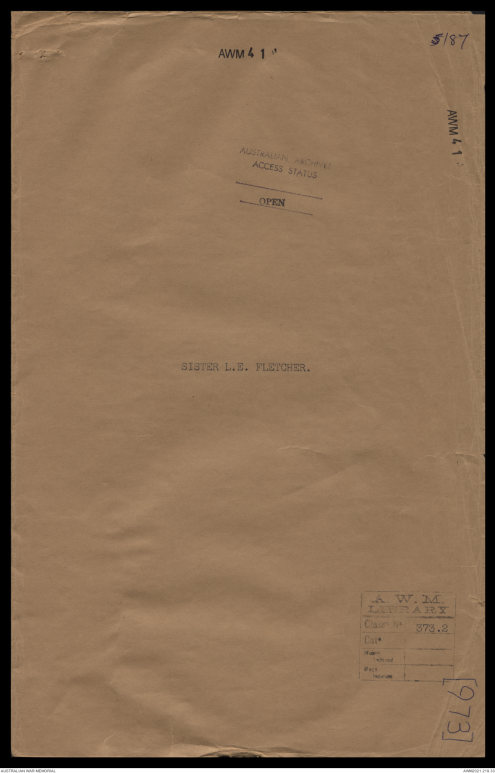
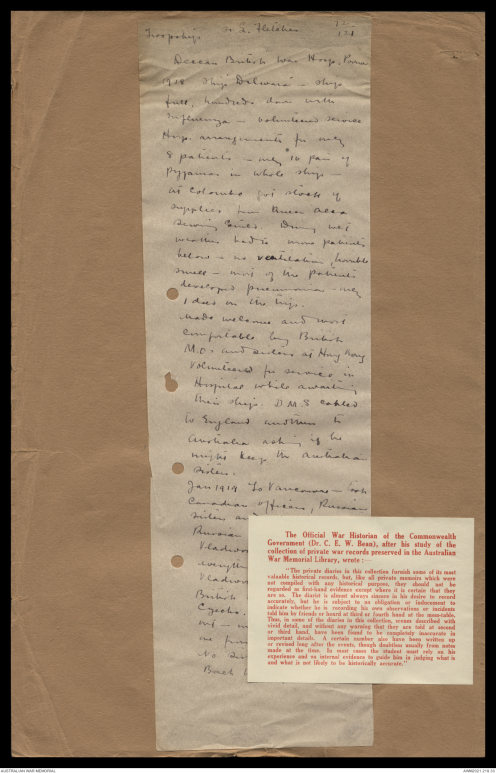
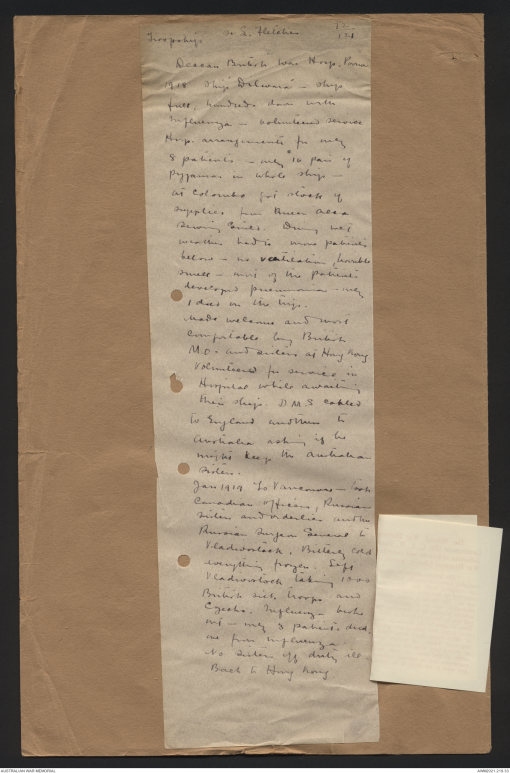
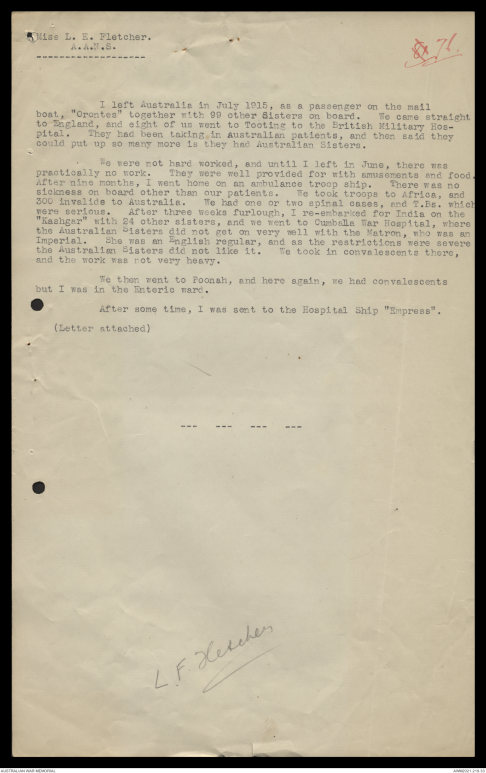
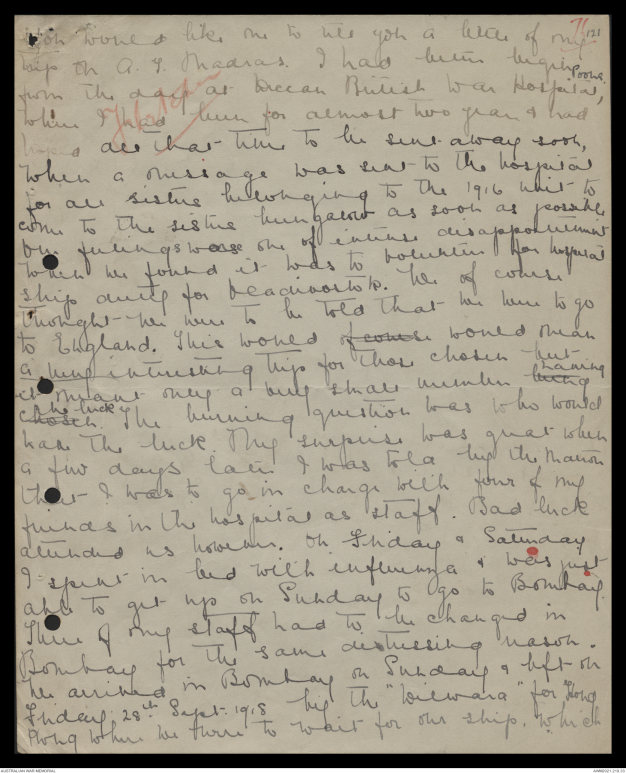
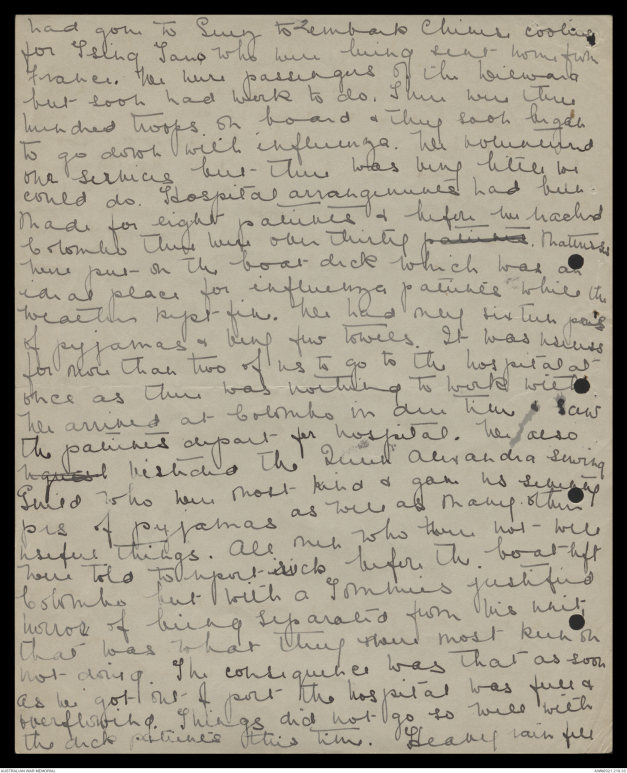
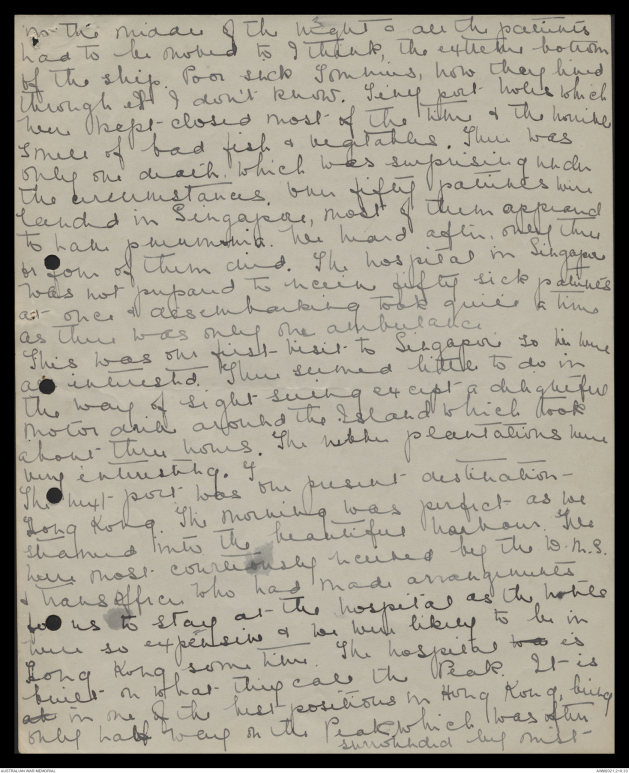
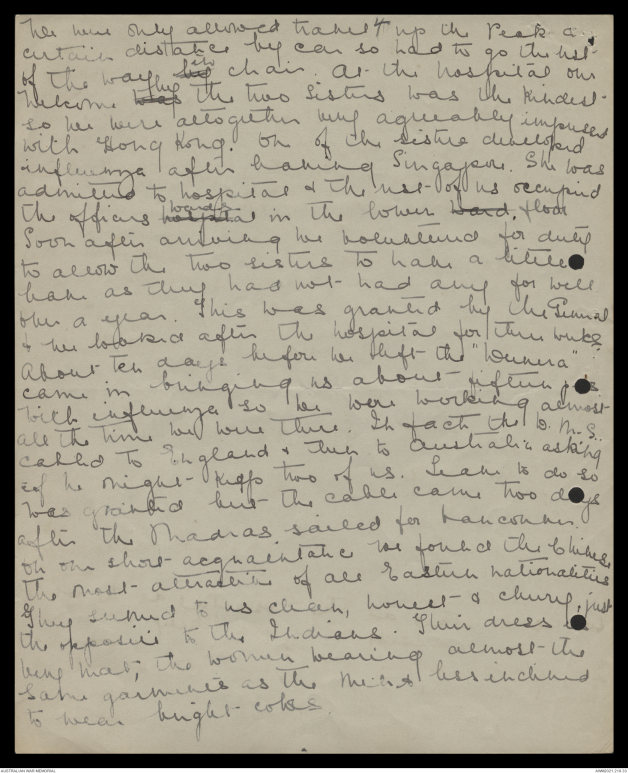
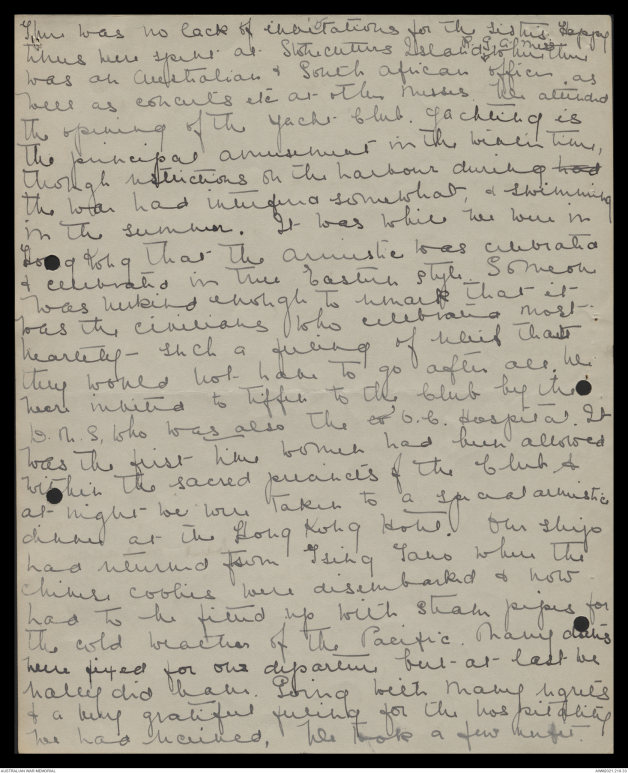
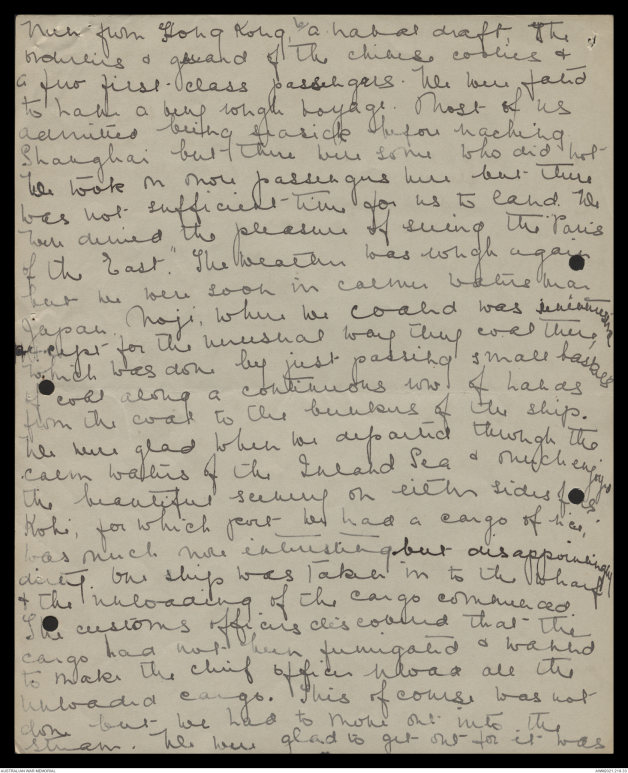
5187
AWM 4 1
[*AWM 4 1*]
AUSTRALIAN ARCHIVES
ACCESS STATUS
OPEN
SISTER L.E. FLETCHER.
A.W.M.
LIBRARY
Clasifn 373.2
[973]
The Official War Historian of the Commonwealth
Government (Dr. C. E. W. Bean), after his study of the
collection of private war records preserved in the Australian
War Memorial Library, wrote:-
"The private diaries in this collection furnish some of its most
valuable historical records, but, like all private memoirs which were
not compiled with any historical purpose, they should not be
regarded as first-hand evidence except where it is certain that they
are so. The diarist is almost always sincere in his desire to record
accurately, but he is subject to no obligation or inducement to
indicate whether he is recording his own observations or incidents
told him by friends or heard at third or fourth hand at the mess-table.
Thus, in some of the diaries in this collection, scenes described with
vivid detail, and without any warning that they are told at second
or third hand, have been found to be completely inaccurate in
important details. A certain number also have been written up
or revised long after the events, though doubtless usually from notes
made at the time. In most cases the student must rely on his
experience and on internal evidence to guide him in judging what is
and what is not likely to be historically accurate".
Sr. [[L.?]] Fletcher 12/121
Troopships
Deccan British War Hosp. Poona
1918 Ship 'Wilwara' - ships
full, hundreds down with
influenza - volunteered service
Hosp. arrangements for only
8 patients - only 16 pairs of
pyjamas in whole ship -
in Colombo got stock of
supplies from Queen Alex
Sewing Guild. Owing wet
weather had to move patients
below - no ventilation, horrible
smell - nine of the patients
developed pneumonia - only
1 died on the trip.
made welcome and most
comfortable by British
M.O. and sisters at Hong Kong
Volunteered for service in
Hospital while awaiting
their ships D.M.S cabled
to England and and then to
Australia asking if he
might keep the Australian
Sisters.
Jan 1919 To Vancouver - took
Canadian officers, Russian
Sisters and orderlies and the
Russian Surgeon General to
Vladivostok, Bitterly cold
everything frozen. Left
Vladivostok taking 1000
British sick troops and
Czechs. Influenza broke
out - only 3 patients died,
one from influenza
No Sisters off duty ill
Back to Hong Kong.
81 76.
Miss L. E. Fletcher.
A.A.N.S.
I left Australia in July 1915, as a passenger on the mail
boat, Orontes" together with 99 other Sisters on board. We came straight
to England, and eight us went to Tooting to the British Military Hospital.
They had been taking in Australian patients, and then said they
could put up so many more is they had Australian Sisters.
We were not hard worked, and until I left in June, there was
practically no work. They were well provided for with amusements and food.
After nine months, I went home on an ambulance troop ship. There was no
sickness on board other than our patients. We took troops to Africa, and
300 invalids to Australia. We had one or two spinal cases, and T.Bs. which
were serious. After three weeks furlough, I re-embarked for India on the
"Kashgar" with 24 other sisters, and we went to Cumballa War Hospital, where
the Australian Sisters did not get on very well with the Matron, who was an
Imperial. She was an English regular, and as the restrictions were severe
the Australian Sisters did not like it. We took in convalescents there,
and the work was not very heavy.
We then went to Poonah, and here again, we had convalescents
but I was in the Enteric ward.
After some time , I was went to the Hospital Ship "Empress".
(Letter attached)
L.F. Fletcher
76
121
You would like me to tell you a little of my
trip on A. I. Madras. I had better begin
from the day at Deccan British War Hospital, Poona.
where I had been for almost two years & had
hoped all that time to be sent away soon,
when a message was sent to the hospital
for all sisters belonging to the 1916 unit to
come to the sisters bungalow as soon as possible
Our feelings were one of intense disappointment
when we found it was to volunteer for hospital
ships duty for Vladivostok. We of course
thought we were to be told that we were to go
to England. This would of course would mean
a very interesting trip for those chosen but
it meant only a very small number being havingchosen the luck. The burning question was who would
have the luck. My surprise was great when
a few days later I was told by the Matron
that I was to go in charge with four of my
friends in the hospital as staff. Bad luck
attended us however. On Friday & Saturday
I spent in bed with influenza & was just
able to get up on Sunday to go to Bombay.
Three of my staff had to be changed in
Bombay for the same distressing reason.
We arrived in Bombay on Sunday & left on
Friday 28th Sept. 1918 by the "Wilwara" for Hong
Kong where we were to wait for our ships. Which
2
had gone to Suez to embark Chinese coolies
for Tsing Tano who were being sent home from
France. We were passengers of the Wilwara
but soon had work to do. There were three
hundred troops on board & they soon began
to go down with influenza. We volunteered
our service but there was very little we
could do. Hospital arrangements had been
made for eight patients & before we reached
Colombo there were over thirty patients. Mattresses
were put on the boat deck which was an
ideal place for influenza patients while the
weather kept fine. We had only sixteen pairs
of pyjamas & very few towels. It was useless
for more than two of us to go to the hospital at
once as there was nothing to work with.
We arrived at Colombo in due time & saw
the patients depart for hospital. We alsorequest visited the Queen Alexandra Sewing
Guild who were most kind and gave us seventy
prs of pyjamas as well as many other
useful things. All men who were not well
were told to report sick before the boat left
Colombo but with a Tommies justified
horror of being separated from his unit,
that was what they were most keen on
not doing. The consequence was that as soon
as we got out of port the hospital was full &
overflowing. Things did not go so well with
the deck patients this time. Heavy rain fell
3
in the middle of the night & all the patients
had to be moved to I think, the extreme bottom
of the ship. Poor sick Tommies, how they lived
through it I don't know. Tiny port holes which
were kept closed most of the time & the horrible
smell of bad fish & vegetables. There was
only one death. Which was surprising under
the circumstances. Over fifty patients were
landed in Singapore, most of them appeared
to have pneumonia. We heard after only three
or four of them died. The hospital in Singapore
was not prepared to receive fifty sick patients
at once & disembarking took quite a time
as there was only one ambulance.
This was our first visit to Singapore so we were
axx interested. There seemed little to do in
the way of sight seeing except a delightful
motor drive around the Island which took
about three hours. The rubber plantations were
very interesting. Y
The next port was our present destination -
Hong Kong. The morning was perfect as we
steamed into the beautiful harbour. We
were most courteously received by the D.M.S.
& Trans officer who had made arrangements
for us to stay at the hospital as the hotels
were so expensive & we were likely to be in
Hong Kong some time. The hospital was is
built on what they call the Peak. It isab in one of the best positions in Hong Kong, being
only half way on the Peak, which was often
surrounded by mist
4
We were only allowed travel up the Peak a
certain distance by car so had to go the rest
of the way by in chair. At the hospital our
welcome was by the two sisters was the kindest
so we were altogether very agreeably impressed
with Hong Kong. One of the sisters developed
influenza after leaving Singapore. She was
admitted to hospital & the rest of us occupied
the officers hospital wards in the lower ward, floor
Soon after arriving we volunteered for duty
to allow the two sisters to have a little
leave as they had not had any for well
over a year. This was granted by the General
& we looked after the hospital for three weeks.
About ten days before we left the "Dunera"
came in bringing us about fifteen pxs
with influenza so we were working almost
all the time we were there. In fact the D.M.S.
cabled to England & then to Australia asking
if he might keep two of us. Leave to do so
was granted but the cable came two days
after the Madras sailed for Vancouver.
On the short acquaintance we found the Chinese
the most attractive of all Eastern nationalities
They seemed to us clean, honest & cheery, just
the opposite to the Indians. Their dress is
very neat, the women wearing almost the
same garments as the men & less inclined
to wear bright colours.
5
There was no lack of invitations for the Sisters. Happy
times were spent at Stonecutters Island ^R.G.G. Mess where there
was an Australian & South African officer as
well as concerts etc at other messes. We attended
the opening of the Yacht Club. Yachting is
the principal amusement in the winter time,
though restrictions on the harbour during had
the war had interfered somewhat, & swimming
in the summer. It was while we were in
Hong Kong that the Armistice was celebrated
& celebrated in the Eastern style. Someone
was unkind enough to remark that it
was the civilians who celebrated most
heartily - such a feeling of relief that
they would not have to go after all. We
were invited to Tiffen to the Club by the
D.M.S. who was also the O.C. Hospital. It
was the first time women had been allowed
within the sacred precincts of the Club &
at night we were taken to a special armistice
dinner at the Hong Kong Hotel. Our ship
had returned from Tsing Tano where the
Chinese coolies were disembarked & now
had to be fitted up with steam pipes for
the cold weather of the Pacific. Many dates
were fixed for our departure but at last we
really did leave. Going with many regrets
& a very grateful feeling for the hospitality
we had received. We took a few unfit
6
Men from Hong Kong, a Labor draft, The
orderlies & guard of the chinese coolies &
a few first-class passengers. We were fated
to have a very rough voyage. Most of us
admitted being seasick before reaching
Shanghai but there were some who did not
We took on more passengers here but there
was not sufficient time for us to land. We
were denied the pleasure of seeing the "Paris
of the East". The weather was rough again
but we were soon in calmer waters near
Japan. Noji, where we coaled was uninteresting
except for the unusual way they coal there,
which was done by just passing small baskets
of coal along a continuous row of hands
from the coal to the bunkers of the ship.
We were glad when we departed through the
calm waters of the Inland Sea & much enjoyed
the beautiful scenery on either sides of us.
Koki, for which port we had a cargo of rice,
was much more interesting but disappointingly
dirty. One ship was taken in to the wharf
& the unloading of the cargo commenced.
The customs officers discovered that the
cargo had not been fumigated & wanted
to make the chief officer reload all the
unloaded cargo. This of course was not
done - but we had to move out into the
stream. We were glad to get out for it was
 Sam scott
Sam scottThis transcription item is now locked to you for editing. To release the lock either Save your changes or Cancel.
This lock will be automatically released after 60 minutes of inactivity.